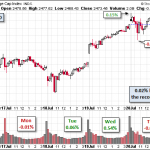Spain’s registered jobless rose for the fourth consecutive month in November official data showed on Wednesday, and was seen edging higher as the recession weighs and a multi-billion euro stimulus package loses steam.
The Spanish economy is not expected to emerge from recession until next year as it reels from the collapse of a decade-long construction-led boom and plummeting consumer spending.
Seasonally unadjusted data showed Spanish jobless claims rose by 60,593 in November from October to almost 3.9 million people, almost a million more than a year ago, the Labour Ministry said.
The rise was less fierce than the almost 100,000 layoffs in October and around 170,000 leap in November 2008, the government noted, but should not be taken as a sign the economy will begin to create jobs any time soon, economists said.
“The November numbers were slightly better than expected. However, in general, unemployment in Spain is likely to increase further, but maybe at a slower pace,” said Giada Giani at Citigroup.
The Spanish government pumped €8bn into the economy this year to create more than 400,000 mostly low-skilled jobs in an attempt to patch the hole left by the paralysed housing sector.
The around 30,000 infrastructure contracts created by the plan will be completed by the end of the year, and with little sign of a general return to growth, Spain’s labourers are once again expected to rejoin dole queues.
“We don’t see the government suddenly withdrawing stimulus measures to help workers. But in 2010 we continue to see unemployment increasing with minimal growth expected,” said Silvio Peruzzo at RBS.
The government has announced plans to launch a new €5bn stimulus plan for 2010, but it will be aimed at sustainable long-term growth sectors like renewable energy, environmental tourism and new technologies.
Reform talks
While economists have called for wide-sweeping reforms to the labour market, the government has been cautious to make any major proposals which have not been decided through consensus with the workers’ unions and business representatives.
Spanish Prime Minister Jose Luis Rodriguez Zapatero outlined several areas in which the labour market could be streamlined on Wednesday and said tripartite talks on the measures will begin in the first quarter of next year.
But analysts worry that the number of jobless would continue to increase in the absence of urgent reforms and as the recession drags on.
Eurozone-wide unemployment remained stable at an 11-year high in October at 9.8 percent, official data showed on Tuesday, while Spain stood at 19.3 percent in same month, the worst in the 16-member region.
Last year’s sudden collapse of the construction sector has quickly spread across the whole economy and all main economic areas registered losses in November, the government said.
Data showed the jobless rate in the service industry rose 1.7 percent month-on-month and by 1.3 percent in construction. Joblessness also increased by 0.6 percent in the industrial sector and by 2.6 percent in agriculture.












Leave A Comment